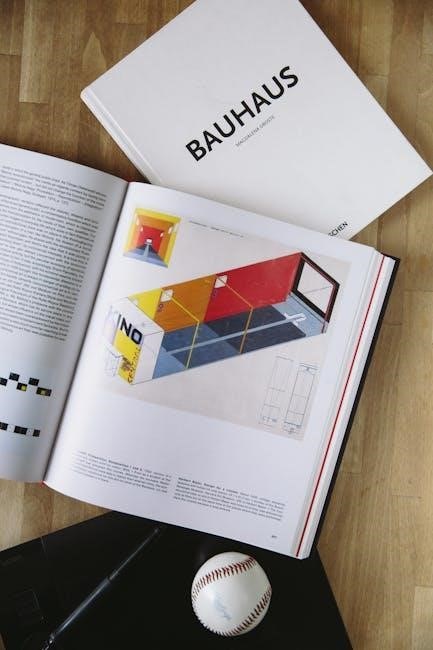Patrick Lencioni’s framework identifies six distinct productivity roles, helping individuals and teams understand their natural contributions to work, fostering collaboration and efficiency in achieving goals.
Overview of the Framework
The 6 Types of Working Genius framework, developed by Patrick Lencioni, identifies six distinct productivity roles: Invention, Discernment, Galvanizing, Enablement, Inception, and Tenacity. These roles are interdependent, forming a comprehensive process for accomplishing work. The model helps individuals understand their natural contributions, reducing frustration and enhancing collaboration. Unlike traditional personality assessments, it focuses on productivity, offering a practical approach to identifying strengths and weaknesses in the workplace.
Importance of Understanding Working Genius
Understanding the 6 Types of Working Genius is crucial for optimizing workplace productivity and collaboration. By identifying individual strengths, teams can allocate tasks effectively, leveraging each member’s unique contributions. This framework fosters a culture of awareness, reducing friction and enhancing overall performance. It also helps leaders recognize and utilize the diverse talents within their teams, leading to improved morale and efficiency. Embracing this model ensures that every role is valued, creating a balanced and high-performing work environment.

The Six Types of Working Genius
The framework outlines six distinct roles: Invention, Discernment, Galvanizing, Enablement, Inception, and Tenacity. Each represents unique contributions to workplace productivity and collaboration.
Invention
Invention is the first type of Working Genius, focusing on generating ideas and possibilities. Individuals with this genius are naturally creative and visionary, excelling at brainstorming and exploring new opportunities. They thrive in environments where they can think freely and contribute innovative solutions. Invention is the spark that ignites the creative process, making it essential for initiating projects and driving innovation; Without Invention, teams may struggle to find new directions or solutions to challenges.
Discernment
Discernment is the second type of Working Genius, centered on evaluating ideas and making wise decisions. Individuals with this genius possess a keen ability to assess options, identify pros and cons, and provide clear judgment. They ensure that the best ideas move forward while filtering out less viable options. Discernment acts as a critical filter, safeguarding teams from pursuing flawed concepts and ensuring alignment with strategic goals. This genius is vital for maintaining quality and focus in decision-making processes.
Galvanizing
Galvanizing is the third Working Genius type, focusing on inspiring and motivating others to take action. Individuals with this genius excel at rallying teams, turning ideas into momentum, and driving progress. They thrive in environments where they can energize others, breaking down barriers and fostering commitment. Galvanizing acts as the catalyst that moves projects forward, ensuring ideas are implemented effectively. This genius is essential for overcoming inertia and maintaining team motivation, making it a cornerstone of productive collaboration and successful execution.
Enablement
Enablement is the fourth Working Genius type, centered on supporting and empowering others to succeed. Individuals with this genius naturally assist in bringing ideas to life by providing resources, guidance, and encouragement. They excel at removing obstacles and ensuring team members have what they need to thrive. Enablement fosters collaboration and strengthens team dynamics, making it a vital component for turning concepts into actionable results. This genius is about creating an environment where everyone can contribute effectively, driving both individual and team success.
Inception
Inception is the fifth Working Genius type, focusing on initiating new ideas and opportunities. Individuals with this genius are natural starters, excelling at envisioning possibilities and setting the foundation for projects. They thrive in the early stages of work, where creativity and innovation are key. Inception involves identifying needs, brainstorming solutions, and laying the groundwork for future efforts. This genius is crucial for kickstarting initiatives and ensuring that teams have a clear direction to pursue their goals effectively.
Tenacity
Tenacity is the sixth Working Genius type, characterized by a relentless drive to push projects through to completion. People with this genius excel at overcoming obstacles, maintaining momentum, and ensuring tasks are finalized. They are detail-oriented and persistent, often stepping in during the final stages to ensure quality and accountability. Tenacity is essential for driving results, as it bridges the gap between ideas and outcomes, making it a cornerstone of successful project execution and team achievement.

Understanding Each Working Genius Type
Each Working Genius type represents unique strengths, from ideation to execution, helping individuals and teams understand their natural contributions to workplace success and collaboration.
Role of Invention in the Workplace
Invention is the genius of generating new ideas and solutions, serving as the catalyst for innovation. It identifies opportunities and creates the foundation for projects, ensuring progress begins. Without invention, teams lack the spark to initiate meaningful work. While other geniuses refine and execute ideas, invention sets the stage, making it a vital component of the Working Genius framework.
Strengths and Weaknesses of Discernment
Discernment excels in evaluating ideas, ensuring quality and alignment with goals, and preventing missteps. It provides clarity and strategic direction. However, its focus on analysis can delay decisions, and over-reliance on it may stifle innovation. Balancing discernment with other geniuses is crucial for effective teamwork and progress.
Galvanizing: Motivating Teams to Action
Galvanizing is the catalyst that transforms ideas into action, inspiring teams to move forward with enthusiasm. It excels at rallying support, overcoming inertia, and maintaining momentum. However, its intense focus on action can sometimes overlook details or bypass necessary planning. When balanced with other geniuses, galvanizing ensures that projects are both initiated and completed effectively, driving progress without compromising quality or collaboration.
Enablement: Supporting Team Success
Enablement is the genius of supporting others to succeed, ensuring teams have the resources and clarity needed to thrive. It excels at removing obstacles, providing guidance, and fostering collaboration. While it is not focused on initiating ideas, it is crucial for sustaining momentum and helping others perform at their best. Enablement works hand-in-hand with other geniuses, like Galvanizing, to ensure ideas are not only launched but also nurtured to completion. This role is vital for maintaining team morale and driving projects forward effectively.
Inception: Initiating New Ideas
Inception is the spark that ignites the creative process, driven by curiosity and a knack for spotting opportunities. It is essential for initiating new ideas, setting the stage for innovation. Individuals with this genius thrive on exploring possibilities, making them unique contributors. Inception works closely with Discernment to refine ideas and Galvanizing to mobilize action. While it is just the first step, Inception is vital for fostering a culture of innovation and progress. Without it, teams might struggle to find the spark needed to launch new projects, making it a cornerstone of organizational growth and adaptation.
Tenacity: Driving Projects to Completion
Tenacity is the driving force behind completing tasks, ensuring projects are seen through to the end. Individuals with this genius thrive on accountability and focus, pushing through challenges to deliver results. They provide stability and reliability, making them indispensable in maintaining momentum; While Tenacity works closely with Enablement to support teams, its primary role is to ensure nothing is left unfinished. This genius is crucial for overcoming obstacles and meeting deadlines, ensuring that efforts are not wasted and goals are achieved effectively and efficiently.

Applying the Framework in Team Dynamics
Understanding and leveraging the 6 Types of Working Genius enhances team collaboration by identifying strengths, fostering balanced roles, and improving overall productivity and efficiency in achieving shared goals.
Identifying Individual Genius Types
Identifying individual genius types begins with the Working Genius assessment, a 10-minute tool developed by Patrick Lencioni. It reveals how each person naturally contributes to work, categorizing them into one of the six geniuses: Invention, Discernment, Galvanizing, Enablement, Inception, or Tenacity. This clarity helps individuals understand their strengths and frustrations, enabling teams to allocate tasks more effectively. By recognizing these roles, organizations can create synergy, reduce conflicts, and enhance productivity, ensuring that every team member is positioned to excel in their area of natural talent.
Building Balanced Teams with Diverse Geniuses
Creating teams with diverse geniuses ensures comprehensive coverage of all work stages, from idea generation to execution. Each genius type—Invention, Discernment, Galvanizing, Enablement, Inception, and Tenacity—plays a unique role. A balanced team combines these strengths to address challenges effectively. Without diversity in geniuses, teams may struggle with gaps in innovation, decision-making, or follow-through. By embracing this interdependence, organizations foster collaboration, maximize efficiency, and achieve sustainable success, ensuring that every phase of work is supported by the right expertise.
Addressing Gaps in Team Genius Composition
Identifying gaps in team genius composition is crucial for optimal performance. Leaders should assess which geniuses are underrepresented and strategize ways to fill these voids. This may involve training existing members, hiring new talent, or collaborating with other teams. By addressing gaps, teams ensure all stages of work—from ideation to execution—are supported. A balanced composition fosters efficiency, innovation, and sustained success, preventing bottlenecks and enhancing overall productivity. Proactively managing these gaps ensures that every genius type contributes meaningfully, driving projects to completion and fostering a high-performing team dynamic.

Impact on Productivity and Collaboration
Understanding the 6 Types of Working Genius enhances productivity by aligning tasks with natural strengths, reducing friction, and fostering collaboration. This framework helps teams achieve efficiency and harmony.
Enhancing Team Efficiency
By identifying and leveraging the 6 Types of Working Genius, teams can allocate tasks based on natural strengths, reducing redundant efforts and minimizing bottlenecks. This framework ensures that each member contributes optimally, aligning their work with their innate abilities. When roles are clearly defined, collaboration becomes seamless, and productivity soars. Teams experience improved morale as individuals feel valued for their unique contributions. This approach not only enhances efficiency but also fosters accountability and a shared sense of purpose, leading to better outcomes and a more cohesive work environment.
Improving Communication Among Team Members
Understanding the 6 Types of Working Genius fosters clear and effective communication by helping team members recognize each other’s strengths and approaches. When individuals know their roles, they can articulate their needs and contributions more precisely. This clarity reduces misunderstandings and ensures that ideas are shared and acted upon efficiently. Enhanced communication also promotes mutual respect, as team members appreciate how their diverse geniuses complement each other. This collaborative dynamic leads to more aligned and productive interactions, strengthening overall team performance and cohesion.
Resolving Conflicts Through Genius Awareness
Recognizing individual Working Genius types helps address conflicts by aligning diverse perspectives. When team members understand their natural contributions, they can communicate more effectively and appreciate differing strengths. For instance, Invention and Discernment may clash, but awareness fosters mutual respect, guiding productive dialogue. By leveraging each type’s unique value, teams can resolve disagreements efficiently, ensuring collaboration and progress. This approach minimizes friction and enhances unity, transforming potential conflicts into opportunities for growth and innovation.

Assessment and Implementation
The Working Genius assessment identifies natural strengths, guiding individuals and teams to optimize contributions. Results are interpreted to align roles with productivity, enhancing workplace efficiency and collaboration.
How to Take the Working Genius Assessment
The Working Genius assessment is an online tool designed to identify individual strengths and productivity preferences. It takes approximately 10 minutes to complete and consists of a series of questions that evaluate how you naturally approach work. The assessment is not a personality test but rather a framework to uncover your contributions to a team. Once completed, it provides insights into your top genius types, areas of frustration, and how to align your role with your strengths. Leaders and teams can use these insights to optimize collaboration and productivity, ensuring each member is in their “genius zone.”
Interpreting Assessment Results
Assessment results reveal your top two genius types, areas where you may feel frustrated, and your natural contributions to work. The report categorizes six geniuses, helping you understand your strengths and weaknesses. For example, if you score high in Invention, you likely excel at generating ideas. Conversely, low scores in Enablement may indicate challenges in supporting others. These insights allow you to align your role with your strengths, enhancing productivity and reducing frustration. Understanding your results helps you communicate your value to teams and leaders, fostering a more collaborative and efficient work environment.
Integrating Genius Insights into Daily Work
By understanding your genius type, you can align your work with your natural strengths, enhancing productivity and job satisfaction. Share your results with your team to improve collaboration and communication. For example, if your strength is Invention, focus on idea generation, while leaning on others for execution. Recognizing your frustrations helps you avoid tasks that drain your energy. Regularly reflecting on your genius type ensures you contribute meaningfully and work efficiently, fostering a more aligned and effective work environment for everyone involved.

Differentiating from Other Personality Assessments
The Working Genius framework focuses on workplace productivity, unlike personality tests like Myers-Briggs or Enneagram, offering a simpler, action-oriented approach to understanding work contributions and strengths.

Comparison with Myers-Briggs and Enneagram
The Working Genius framework differs from Myers-Briggs and Enneagram by focusing specifically on workplace productivity rather than broader personality traits. While Myers-Briggs categorizes individuals into 16 types and the Enneagram into 9, Working Genius simplifies contributions into six actionable roles. This makes it more practical for team dynamics and work-related decisions. Unlike traditional personality assessments, it avoids complex labeling, emphasizing how individuals naturally contribute to tasks and projects. Its straightforward approach makes it easier for teams to identify strengths and weaknesses, fostering collaboration without the depth of personal analysis found in other models.
Unique Aspects of the Working Genius Model
The Working Genius framework stands out for its focus on productivity and natural work contributions rather than personality traits. It breaks work into three stages, with six distinct roles, simplifying how individuals and teams collaborate. Unlike traditional assessments, it’s not a personality test but a practical tool for workplace effectiveness. Its simplicity, with fewer types compared to Myers-Briggs or Enneagram, makes it easy to apply. Additionally, the quick 10-minute assessment and actionable insights make it ideal for immediate implementation, fostering team efficiency and addressing gaps in work dynamics.

Leadership and the 6 Types of Working Genius
Patrick Lencioni’s framework helps leaders identify team strengths and weaknesses, fostering collaboration and productivity by aligning roles with natural work geniuses, enhancing overall leadership effectiveness.
Leading Teams with Diverse Genius Types
Leading teams with diverse genius types involves recognizing and leveraging the unique strengths each member brings. By understanding the six working geniuses, leaders can align roles with natural talents, fostering collaboration and innovation. This approach ensures that invention, discernment, galvanizing, enablement, inception, and tenacity are all represented, creating a balanced and high-performing team. Leaders who embrace this framework can address gaps, enhance communication, and drive productivity, ultimately creating an environment where every team member thrives and contributes meaningfully to shared goals.
Recognizing Genius in Employees
Recognizing genius in employees involves identifying their natural strengths and contributions. The six working geniuses provide a clear framework for understanding individual talents, enabling leaders to acknowledge and nurture these abilities. By observing how employees excel in areas like invention, discernment, or enablement, leaders can align roles with their innate genius. This recognition boosts morale, engagement, and productivity while fostering a culture of appreciation and growth. When employees feel their unique contributions are valued, they are more likely to thrive and drive team success. This approach ensures each individual’s potential is fully realized.
Fostering a Genius-Oriented Work Culture
A genius-oriented work culture encourages employees to embrace their unique strengths and collaborate effectively. Leaders play a crucial role by promoting open communication about each team member’s working genius. This fosters mutual respect and understanding, allowing individuals to leverage their natural talents. Regular feedback and recognition of contributions tied to their genius type further reinforce this culture. By aligning roles with innate abilities, organizations create an environment where employees feel valued and empowered, leading to higher engagement and productivity. This approach not only enhances individual performance but also strengthens overall team dynamics.

Future Trends and Relevance
The 6 Types of Working Genius framework is gaining popularity as a practical tool for modern workplaces, adapting to remote environments and evolving team dynamics effectively.
Evolving Workforce and Genius Types
The modern workforce is rapidly evolving, with remote work and shifting employee expectations reshaping how teams operate. The 6 Types of Working Genius framework remains highly relevant, as it helps individuals and organizations adapt to these changes. By understanding each genius type, teams can better navigate the challenges of a changing workforce, ensuring collaboration and productivity. The framework’s emphasis on diverse roles aligns with the growing need for flexibility and inclusivity in today’s work environments, making it a valuable tool for future-ready organizations.
Adapting the Framework to Remote Work
As remote work becomes the norm, the 6 Types of Working Genius framework offers a robust approach to maintaining collaboration and productivity. By identifying individual strengths, teams can allocate tasks effectively, even in virtual settings. Tools like digital communication platforms and asynchronous work processes support the framework’s principles, ensuring that each genius type contributes meaningfully. This adaptability highlights the framework’s relevance in modern work environments, fostering efficiency and engagement among remote teams.
The 6 Types of Working Genius framework offers a practical approach to enhancing productivity and collaboration, empowering individuals and teams to thrive in any work environment.
Summarizing Key Takeaways
The 6 Types of Working Genius framework, developed by Patrick Lencioni, helps individuals identify their natural work strengths and contributions. It emphasizes the importance of collaboration, as each genius type plays a unique role in achieving collective success. By understanding these roles, teams can reduce frustration and enhance productivity. The framework is practical, easy to apply, and focuses on productivity rather than personality, making it a valuable tool for fostering a more efficient and harmonious work environment.
Encouraging Continuous Learning and Application
Continuous learning is essential for maximizing the potential of the 6 Types of Working Genius. Encourage team members to explore their strengths and weaknesses regularly. Provide resources like workshops, books, and online communities to deepen their understanding. Leaders should foster an environment where employees feel comfortable applying their genius types in daily tasks. Regular feedback and growth opportunities can help individuals refine their contributions, leading to a more productive and engaged workforce. This ongoing development ensures teams remain aligned with their strengths and continue to thrive.
Additional Resources
Explore books by Patrick Lencioni and online tools for deeper insights into the 6 Types of Working Genius, enhancing your understanding and application of the framework;
Recommended Reading on Working Genius
Patrick Lencioni’s groundbreaking book introduces the 6 Types of Working Genius, offering insights into understanding and leveraging individual strengths for workplace success. Supplement your knowledge with e-books and guides that delve into practical applications of the framework. Explore additional resources like “The Five Dysfunctions of a Team” for complementary leadership strategies. These materials provide actionable tools and real-world examples to enhance collaboration and productivity, helping you and your team thrive in any professional setting.
Online Communities and Forums
Engage with online communities dedicated to the 6 Types of Working Genius to deepen your understanding and connect with like-minded professionals. Join forums on LinkedIn, Facebook, and specialized productivity groups to discuss insights, share experiences, and gain practical advice. These platforms offer valuable resources, webinars, and discussions led by experts. Participate in debates about workplace efficiency and collaboration, and discover how others are applying the Working Genius framework. These communities provide a dynamic space for learning and networking, helping you stay updated on the latest trends and applications of the model.
Workshops and Training Opportunities
Explore workshops and training programs designed to deepen your understanding of the 6 Types of Working Genius. These sessions, often led by certified facilitators from The Table Group, provide hands-on learning experiences. Participants engage in interactive exercises, case studies, and group discussions to apply the framework in real-world scenarios. Workshops focus on enhancing team dynamics, improving collaboration, and aligning individual strengths with organizational goals. They also offer practical tools for leaders to foster a genius-oriented culture. These programs are ideal for teams seeking to enhance productivity and workplace harmony through the Working Genius model.



